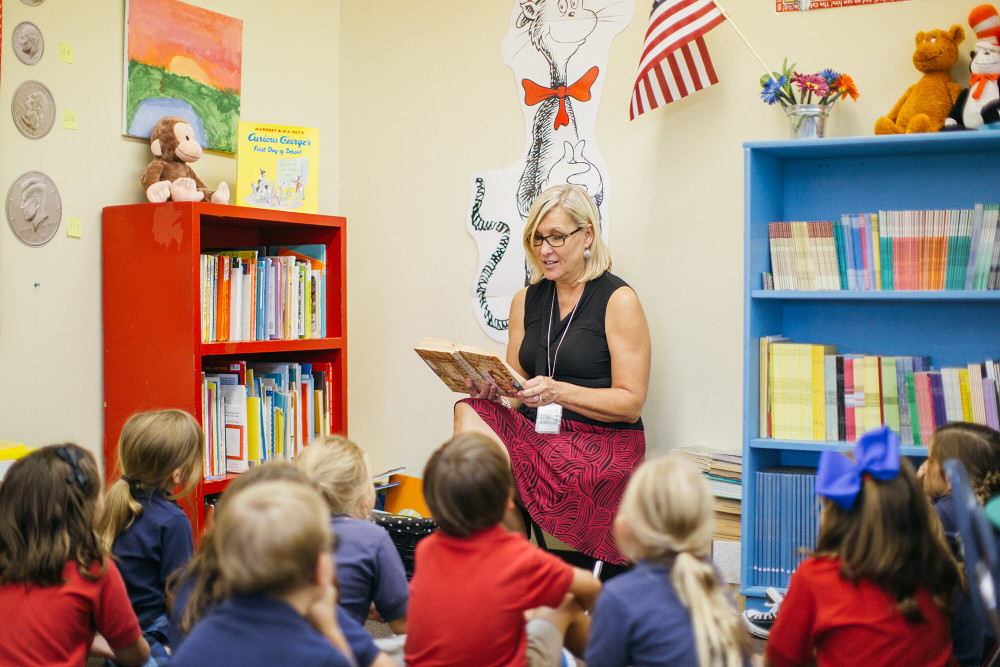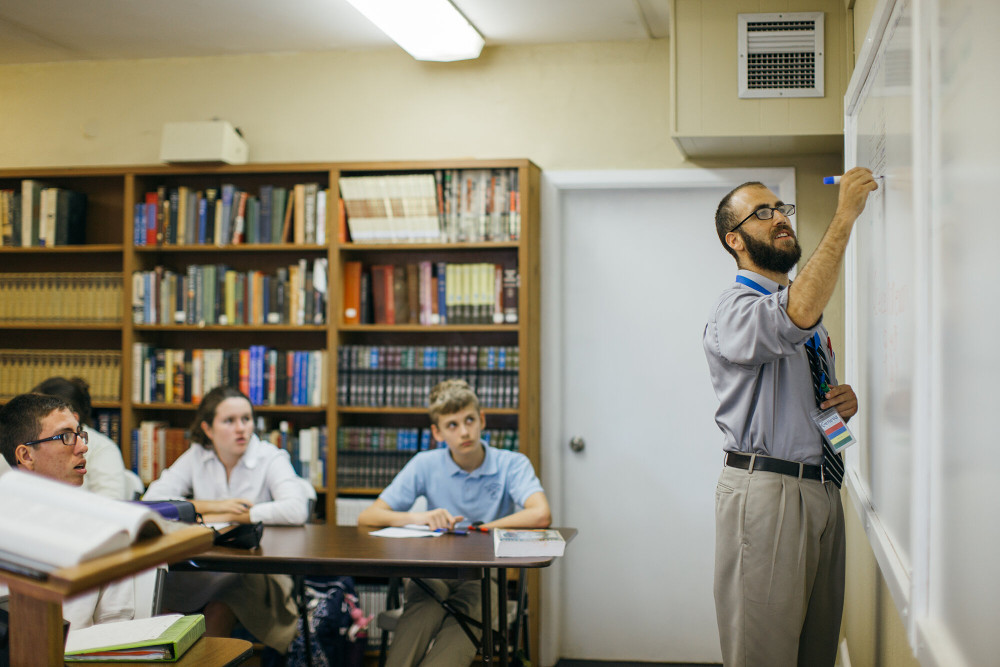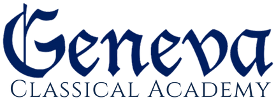Classical Education Model
What is Classical Christian Education?
To clearly explain the classical Christian model of education, we must define both classical and Christian education.
Classical education has inspired great thinkers beginning with the Golden Age of Greece and the Roman Empire. It influenced great kings and reformers of the Middle Ages and philosophers and artists of the Renaissance. It galvanized the Pilgrims and our Founding Fathers in their determination to build a new government. Today, we see the influence of classical education in every academic discipline including science, politics, mathematics, art and astronomy.
What is classical education? It is the process of helping students become great thinkers.
Classical education at Geneva refers to the content and the methodology of instruction. Geneva’s curriculum is classical in content, as distinguished by the integrated study of Scripture, Latin, logic, literature, philosophy and rhetoric in addition to history, mathematics, science and physical education. The school is classical in methodology, as distinguished by it’s embracing the Trivium – a three-pronged approach to the grammar, logic and rhetoric of each subject.

01.
The Grammar Stage
Children from kindergarten (4 and 5 year olds) to 5th grade are adept at memorizing large amounts of information. The youngest in this group can recite a book by heart while the older among them can rattle off whole parts of their favorite movie verbatim. The Grammar stage makes great use of this natural ability to give children a firm foundation of facts in math, phonograms, natural history, geography, science, etc.

02.
The Logic or Dialect Stage
As a child matures from 6th through 8th grade, he/she becomes naturally adept at argument. (Which is why pre and early teens begin to question authority.) In the Dialectic Stage children learn the ins and outs of formal logic. Logic enables them to assimilate the facts they learned in the Grammar Stage into a more thorough and cohesive understanding of their subjects and to arrange their thoughts in a rational and meaningful way.

03.
The Rhetoric Stage
Students have now honed their Socratic skills of asking questions and questioning answers, enabling them to engage the dominant ideas of past and present cultures.
The goal of classical Christian education is not just to graduate students with high GPA’s, who attend the best colleges and universities, or even pull down high-paying jobs. The crowning jewel of classical Christian education is raising individuals who impact their generation and generations to come with the knowledge, understanding, and wisdom found in the Gospel of Christ.
Why Latin?
The classically educated student begins to study Latin in the third grade. We know the study of Latin increases students’ vocabulary and gives them mastery over the English language as well as a foundation for other languages. However, its benefits are also seen in math and science because it trains the mind in logic, detail and problem solving.
Not Just Another Christian School
Deuteronomy 6 instructs us to use the Bible as a grid to teach our children all about life. A classical Christian school does not simply add Bible courses and Bible memorization to the students’ day. It views all subjects through the lens of Scripture. The Reformed faith uniquely challenges the faithful to take every thought captive to the obedience of Christ. (2 Corinthians 10:5) In this way, students can address and impact their culture. As Paul appealed to Athenians based on what he knew of their poets and gods, so classical Christian education will prepare students to address the people and issues of their times.
Jesus said that loving God with all our heart, soul, and mind is the first and greatest commandment (Matthew 22:37-38). Classical Christian education is a time-proven way to accomplish this.
What Is An Integrated Curriculum?
Most contemporary Americans’ high school education consists of “subjects”: math, science, English, and history. These subjects are taught by teachers who know their individual disciplines. For example, in Algebra class, students learn mathematical terms, how to solve equations, and graphing; in Civics, students study the War for Independence, the Constitution, and the three branches of government; English students are taught to write complete sentences with subject and verb agreement, proper modifiers, and punctuation, while reading some interesting fiction and poetry.
The problem in these compartmentalized subjects is this: equations have nothing to do with history; punctuation is irrelevant to the Constitution; and Thomas Jefferson is disconnected from Greek city-states. Perhaps most regrettably, morality and ethics are not part of the curriculum; whether or not the colonists should have fought the war against Britain is never addressed. The modern high schooler learns how to study for tests and subsequently forgets the material because it is not needed again. The result is that each subject is an air-tight compartment from the next, never overlapping or relating.
David Hicks describes the mainstream school experience when he says in his book, Norms and Nobility, “Whatever [the modern educator’s] reasons for rejecting the classical curriculum, his classrooms suffer from its absence in three notable ways. In them, human experience tends to be dealt with narrowly and reductively, broken down into isolated, unconnected units; students ignorant of what questions to ask are presented with uninvited and consequently meaningless information; and there is no basis for making moral and aesthetic judgments or for attaching learning to behavior.”

Modernistic and secular education is missing a very important component, one which classical and Christian education provides: integration. Contemporary education is the outworking of a philosophy that views everything as a machine through which science teaches us to dissect, looking for how things are made. The problem with this approach to education is identified in William Wordsworth’s poem, “The Tables Turned”:
Sweet is the lore which Nature brings;
Our meddling intellect
Mis-shapes the beauteous forms of things:–
We murder to dissect.
“We murder to dissect.” In other words, the compartmentalization of subjects is a dissection and without a synthesis, a bringing back together, the subject dies and beauty is lost. What a tragedy!
Classical education, on the other hand, seeks not only to take things apart to see how they work but also to bring them together again. The Socratic method breaks ideas, information, and subjects down to see how the constituent parts relate, and then it brings them back together to discover how the learner can apply the lesson as well as what people ought to do.
Classical education seeks not only to take things apart to see how they work, but also to bring them together again.
All school subjects are related, and a classical teacher helps the student to discover the connections in two ways: concepts within subjects and concepts between subjects. For example, Julius Caesar being assassinated in 44 B.C. is connected to Octavian becoming Caesar Augustus which has direct bearing on Virgil writing the epic, The Aeneid, which inspired Dante in his writing of The Divine Comedy. All of this has theological implications for Christianity, and furthermore, as Christians, we see all things in God’s world as related and under the Lord’s authority.
C.S. Lewis warned modernity in Abolition of Man “Perhaps, in the nature of things, analytical understanding must always be a basilisk (predatory lizard) which kills what it sees and only sees by killing. But if the scientists themselves cannot arrest this process before it reaches the common Reason and kills that too, then someone else must arrest it.” Geneva Classical Academy exists to arrest the disintegration taking place in education.
